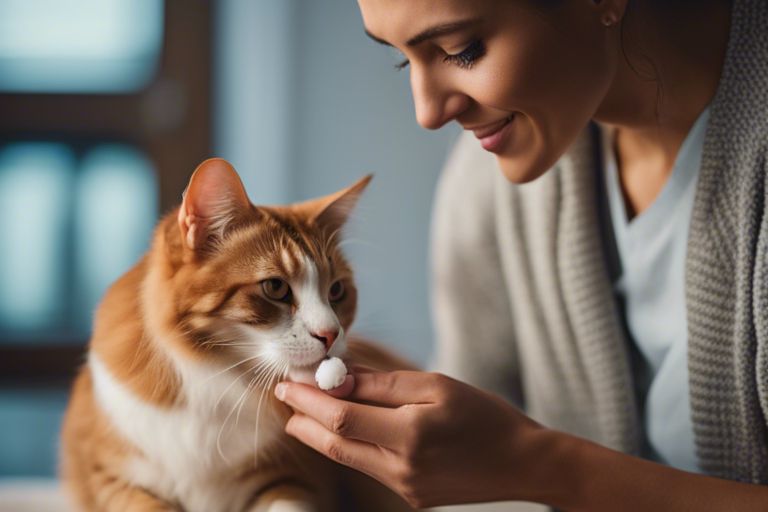Dealing with a cat’s ear infection can be a challenging and worrying experience, but there are steps you can take at home to address the issue. Recognizing the symptoms of an ear infection in your feline friend is crucial. Scratching at the ears, shaking their head, and a foul odor are all potential signs. If you suspect your cat has an ear infection, it’s important to clean their ears regularly to remove any excess wax or debris, but be gentle to avoid causing further irritation. You can also try using a home remedy solution to cleanse your cat’s ears, such as a mixture of apple cider vinegar and water. However, it’s essential to consult with your veterinarian before attempting any home treatments to ensure they are safe and appropriate for your cat’s specific condition.
Key Takeaways:
- Consult with a veterinarian: Before attempting to treat your cat’s ear infection at home, it’s crucial to consult with a veterinarian to accurately diagnose the issue and receive proper guidance on treatment options.
- Clean the ears: Gently clean your cat’s ears with a veterinarian-approved ear cleaner to remove excess wax and debris, which may help alleviate symptoms and promote healing.
- Administer prescribed medication: If your veterinarian prescribes medication for your cat’s ear infection, carefully follow their instructions for administering the medication to ensure effective treatment.
- Monitor for improvement: Keep a close eye on your cat’s symptoms and overall well-being while treating the ear infection at home. If symptoms persist or worsen, seek further guidance from your veterinarian.
- Prevent future infections: Take preventative measures to reduce the risk of your cat developing ear infections in the future, such as regular ear cleaning, maintaining a clean environment, and addressing any underlying health conditions.
The Basics of Treatment
If you suspect that your cat has an ear infection, it’s crucial to begin treatment as soon as possible. Home care can be effective for treating mild ear infections in cats, but it’s important to consult with your veterinarian to ensure that the infection is properly diagnosed and to receive guidance on the best treatment plan. For detailed information on home care for a cat with an ear infection, you can refer to Home Care of the Cat with an Ear Infection.
Preparing to Treat Your Cat at Home
Before you begin treating your cat’s ear infection at home, it’s essential to gather all the necessary supplies. This may include ear cleaning solution, cotton balls, and any medications prescribed by your veterinarian. You’ll also want to choose a quiet and comfortable space for the treatment, where you and your cat can both feel at ease. It’s important to be gentle and patient with your cat throughout the process, as this will help to make the experience more comfortable for them.
When to Consult a Veterinarian
If you notice any of the following signs in your cat, it’s crucial to consult your veterinarian as soon as possible: persistent or severe pain, discharge from the ears, swelling or redness, loss of balance, or a foul odor coming from the ears. Additionally, if your cat’s ear infection does not improve with home care or if their condition worsens, it’s important to seek veterinary care promptly. Your veterinarian can provide a thorough examination and recommend the best course of action for treating your cat’s ear infection.
Home Remedies
Any cat owner knows how distressing it can be to see your furry friend suffering from ear infections. While it’s important to seek veterinary advice for proper diagnosis and treatment, there are some home remedies that may help alleviate your cat’s discomfort and aid in the healing process.
Cleaning Techniques
When it comes to cleaning your cat’s ears, it’s crucial to do so with gentleness and care. Use a veterinarian-recommended ear cleaning solution, and gently wipe the outer ear with a cotton ball moistened with the solution. Avoid inserting anything into the ear canal, as this can cause further damage. If your cat’s ear is painful or inflamed, it’s best to leave the cleaning to a veterinary professional.
Natural Solutions for Pain and Inflammation
For natural solutions to help relieve your cat’s ear pain and inflammation, you can try using warm compresses applied to the affected ear. Simply soak a clean cloth in warm water, wring out the excess, and hold it gently against your cat’s ear for a few minutes. This can provide some relief and promote healing. Additionally, you can incorporate anti-inflammatory herbs such as chamomile and calendula into your cat’s diet, under the guidance of a knowledgeable veterinarian.
Prevention Strategies
Unlike treating an existing ear infection, prevention strategies focus on minimizing the risk of your cat developing ear infections in the future. By implementing these strategies, you can help keep your feline friend’s ears healthy and infection-free.
Diet and Nutrition for Ear Health
Ensuring that your cat is receiving good quality, balanced nutrition is essential for maintaining overall health, including ear health. Diets rich in essential fatty acids, such as omega-3 and omega-6, can help promote healthy skin and coat, including the ear canal. Look for cat foods formulated with high-quality proteins and essential nutrients to support your cat’s overall well-being, which can help reduce the risk of ear infections.
Regular Ear Care and Monitoring
Regularly checking and cleaning your cat’s ears is an important part of preventative care. By routinely examining your cat’s ears, you can identify any abnormalities or early signs of infection. Using a gentle ear cleaner recommended by your veterinarian can help remove excess wax and debris, lowering the risk of infection. Additionally, if your cat is prone to ear infections, your veterinarian may recommend regular ear cleanings as part of their preventative care plan.

How can I treat my cat’s ear infections at home?
Ultimately, treating your cat’s ear infections at home requires diligent and consistent care. By cleaning your cat’s ears regularly with a vet-approved ear cleaner and gently removing any discharge or debris, you can help prevent and reduce the risk of ear infections. Additionally, using veterinarian-prescribed ear drops and medications as directed can help clear up any existing infections. It’s important to closely monitor your cat’s ear health and seek veterinary care if symptoms persist or worsen. By taking proactive measures and following your vet’s guidance, you can effectively treat your cat’s ear infections at home and help ensure their overall well-being.
Frequently Asked Questions
Q: What are the symptoms of ear infections in cats?
A: Symptoms of ear infections in cats can include redness or swelling of the ear canal, a strong odor coming from the ear, excessive scratching or head shaking, and a buildup of dark brown or yellowish discharge. If you notice any of these signs, it’s important to consult with a veterinarian for a proper diagnosis.
Q: Can I treat my cat’s ear infection at home?
A: While it’s crucial to seek veterinary attention for a confirmed diagnosis, some mild cases of ear infections can be managed at home with the guidance of a veterinarian. Your vet may recommend cleaning the ears with a specialized solution and applying prescribed ear drops or ointment. However, it’s important to follow your vet’s instructions carefully and not attempt to treat severe or chronic infections without professional guidance.
Q: How can I prevent ear infections in my cat?
A: To help prevent ear infections in your cat, it’s important to keep their ears clean and dry. Regularly inspect and clean your cat’s ears using a veterinarian-approved ear cleaning solution. Additionally, ensure your cat’s environment is free from irritants and allergens that can contribute to ear infections. If your cat is prone to ear infections, consult with your vet about possible underlying causes and preventative measures.

Jayley, a devoted cat enthusiast, also writer for other cat blog as well. She aims to dedicated to providing comprehensive information, insights, and advice on everything you’d ever want to know about our whiskered companions.
